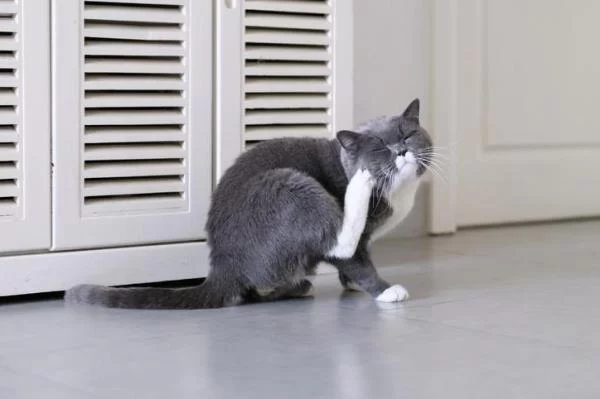- 1-understanding-why-cat-scratching-ears-and-face-constantly-is-not-normal
- 2-common-medical-reasons-behind-cat-scratching-behavior
- 3-behavioral-and-environmental-factors-to-consider
- 4-real-life-story-a-cat-named-luna-who-couldnt-stop-scratching
- 5-what-to-do-if-your-cat-keeps-scratching-its-ears-and-face
1. Understanding Why “Cat Scratching Ears and Face Constantly” Is Not Normal
Cats scratch themselves occasionally—that's normal grooming behavior. But if your cat is constantly scratching its ears and face, especially to the point of redness, hair loss, or scabs, it’s not something to ignore. This behavior may indicate an underlying issue that needs medical attention. From minor irritants to chronic medical conditions, the reasons can be wide-ranging but solvable.
1.1 How Much Scratching Is Too Much?
Occasional pawing at the face is normal. However, when it becomes frequent, intense, or seems to bother your cat throughout the day or night, that’s your sign to take a closer look. Constant scratching can cause skin damage, secondary infections, or signs of distress in your cat.
2. Common Medical Reasons Behind Cat Scratching Behavior
Several health issues could be causing your cat to obsessively scratch its face and ears. Identifying the cause is key to getting your feline friend the right treatment.
2.1 Ear Mites
One of the most common causes, especially in kittens and outdoor cats, is ear mites. These tiny parasites live in the ear canal and cause severe itching. Symptoms include black debris (like coffee grounds) in the ear, head shaking, and constant scratching.
2.2 Allergies
Cats can be allergic to food, pollen, dust, or even grooming products. These allergens can trigger itching and irritation, especially around the ears and face. If your cat also sneezes, grooms excessively, or has watery eyes, allergies might be to blame.
2.3 Skin Infections or Dermatitis
Bacterial or fungal infections can inflame the skin, making it itchy and painful. Dermatitis caused by contact with chemicals, fabrics, or cleaning products can lead to a similar reaction. You may notice red patches, crusting, or open wounds.
2.4 Flea Infestation
Even if you don’t see fleas, they could still be the culprit. Some cats are hypersensitive to flea saliva, and a single bite can cause hours of scratching. Fleas often hide in the fur near the tail, neck, and ears.
3. Behavioral and Environmental Factors to Consider
Not all scratching is due to parasites or allergies. Sometimes, the cause is psychological or environmental. Understanding your cat’s surroundings and emotional well-being can provide important context.
3.1 Stress and Anxiety
Changes in the household—like moving, new pets, or loud noises—can make a cat anxious. One coping mechanism may be excessive grooming or scratching, especially in accessible areas like the ears and face.
3.2 Boredom or Lack of Stimulation
Indoor cats without enrichment may engage in repetitive behaviors out of boredom. If scratching becomes a habit or form of self-soothing, look at how often your cat is being mentally and physically engaged.
3.3 Reaction to New Products
Have you recently changed your cat's food, shampoo, bedding, or even laundry detergent? Cats are sensitive to scent and texture. An allergic or irritant reaction might be coming from something seemingly unrelated to their skin.
4. Real-Life Story: A Cat Named Luna Who Couldn't Stop Scratching
When Sarah adopted Luna, a beautiful tabby with bright green eyes, she noticed the cat kept pawing at her ears and rubbing her face against furniture constantly. Concerned, she brought Luna to Hidden Brook Veterinary, where the vet quickly diagnosed ear mites.
With a simple topical treatment and routine ear cleaning, Luna was back to her playful self in less than a week. Sarah also learned Luna was allergic to a certain scented laundry softener. After switching to a pet-safe alternative, Luna’s scratching completely stopped.
This story is a good reminder that even common issues can be solved quickly with proper care and expert advice.
5. What to Do If Your Cat Keeps Scratching Its Ears and Face
If your cat won’t stop scratching its ears and face, take action before it escalates. Here’s how to start:
5.1 Conduct a Visual Inspection
Look for redness, swelling, hair loss, crusts, or black ear debris. While not a substitute for a vet visit, this can help you communicate symptoms more clearly when seeking help.
5.2 Visit a Veterinarian
Persistent scratching should always be evaluated by a professional. Clinics like Hidden Brook Veterinary specialize in diagnosing skin and ear issues and offer targeted treatments that relieve symptoms quickly.
5.3 Avoid Home Remedies Without Guidance
Don’t try random ointments or oils unless directed by a vet. Some substances are toxic to cats, and incorrect treatment can make the problem worse. Stick to professional advice tailored to your pet’s needs.
5.4 Observe and Adjust the Environment
Minimize allergens, introduce stress-relieving elements like cat trees or interactive toys, and make changes to any recent household products that may be irritating your pet’s skin.
Remember, cats are excellent at hiding pain—but constant scratching is their way of telling you something’s wrong. With the right attention and support, your feline friend can be itch-free and comfortable in no time.












